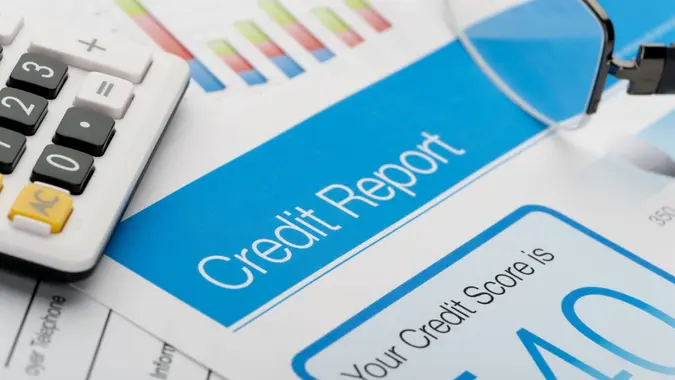I’m a Gen Z Shopper: Can a Store Card Boost My Credit Score Faster?

Commitment to Our Readers
GOBankingRates' editorial team is committed to bringing you unbiased reviews and information. We use data-driven methodologies to evaluate financial products and services - our reviews and ratings are not influenced by advertisers. You can read more about our editorial guidelines and our products and services review methodology.

20 Years
Helping You Live Richer

Reviewed
by Experts

Trusted by
Millions of Readers
In the U.S., having a credit score is essential in many aspects of life. One of the most common areas you’ll typically need credit is when you’re applying for a mortgage or auto loan. The better your score is, the higher your approval odds and the lower your interest rates tend to be.
But your credit score could also come in handy for more obscure things. Having good credit or better could make it easier to get into that apartment complex you’ve been eyeing, or even lower your required deposit. If you’re setting up utilities, the servicing company might run your credit and require a deposit if you have poor or no credit.
If you’re just starting out, as many Gen Zers are, you could use a store credit card to build credit.
GOBankingRates spoke with Said Israilov, a financial planner and wealth manager at Israilov Financial, to find out whether a store card can boost your credit score faster, and whether or not they’re a good idea. Here’s what he said.
You Can Use Store Credit Cards To Build Credit
Right now, Gen Zers are either still in high school or early into their adult lives. This means now’s the time to start building credit, a task that can feel difficult to some.
“As a young immigrant in this country, I often faced difficulties obtaining a bank credit card,” said Israilov. “Macy’s was kind enough to grant me my first credit card. It immediately boosted my credit score, which eventually helped me get approved for credit cards issued by banks.”
Sometimes, all it takes to start building credit is to get your first credit card or loan. For some people, taking out student loans is enough to get them started. For others, a retail credit card is the way to go.
According to the Consumer Financial Protection Bureau (CFPB), you can get a retail store card from places like gas stations, retail chains or regular department stores (like Macy’s).
Although the credit limit is usually lower than what you’d get with a traditional credit card, these cards are also much easier to get. Oftentimes, you’ll be approved if you have limited credit history or no credit score at all.
How To Build Credit with a Store Card
Building credit with a store credit card isn’t much different than building it with a traditional credit card. Your FICO credit score, the one most commonly used by lenders, consists of the following factors:
- Credit mix (10%)
- Length of credit history (15%)
- Payment history (35%)
- Credit utilization or amount owed (30%)
- New credit (10%)
Your credit mix is all the different types of accounts — like credit cards, student loans and auto loans — you have. When you open a credit card with a retailer, you’re adding to your credit mix.
Keeping that account open and in good standing further adds to your overall credit history (measured across all open credit lines or accounts).
“I still use my credit [card] as it helps me maintain the length of my credit history,” said Israilov.
You might not have to keep a balance on your card to establish credit. However, some credit card issuers will automatically close your account after an extended period of inactivity. So, if you’re trying to increase the overall age of your accounts, it might be wise to occasionally use your card to keep it active. Just be sure to pay off the balance right away so you don’t get hit with interest.
Payment history and credit utilization are two of the most important aspects of your credit score. As long as you always make on-time payments with a store card, you can build credit that way. Try to keep your balance low so as not to increase your credit utilization — the total amount owed across all open accounts.
It’s worth noting that applying for a store credit card could result in a hard credit check. This could cause a slight drop in your existing score, if you have one. Only hard inquiries within the past 12 months will count against you, however.
Pros and Cons of Using Store Cards To Boost Your Credit
A store credit card can be a good tool for Gen Z shoppers looking to build credit. The same can also be said for other people with limited or spotty credit history. But there are a few drawbacks to consider.
“Even with store credit cards, it is important to remember to pay the due balance in full to avoid any missed payments,” said Israilov. “Failure to make on-time payments may harm your score.”
Letting your balance get too high could also hurt your overall credit score as it increases your credit utilization. Plus, store credit cards generally come with their own annual percentage rate (APR). The higher your APR and actual balance, the more you could be paying in interest.
On the other hand, responsible use can have some serious advantages. In addition to giving you the chance to build and improve your credit score, Israilov said that many come with shopping perks for loyal customers.
For example, using the Macy’s Star Rewards card lets you earn up to 30% off select purchases. You can also earn between 1 and 5 points per $1 spent, depending on the plan tier (bronze, silver, gold, or premium). Other perks include a birthday surprise, member-exclusive deals and other ways to save.
Avoiding Debt Traps With Store Cards
Whether you use a store credit card or another method to build credit, be careful of debt traps.
A debt trap can occur when you spend more on your card than you can afford to repay. This can lead to high interest charges, high credit utilization and unmanageable monthly payments.
As Israilov pointed out, your best bet to avoid a debt trap is to pay off your full balance each month and avoid missed payments.
Try to view your credit card as an extension of your monthly income. If you don’t have the funds available in your account, don’t charge your card.
 Written by
Written by  Edited by
Edited by 
























